Publications
-
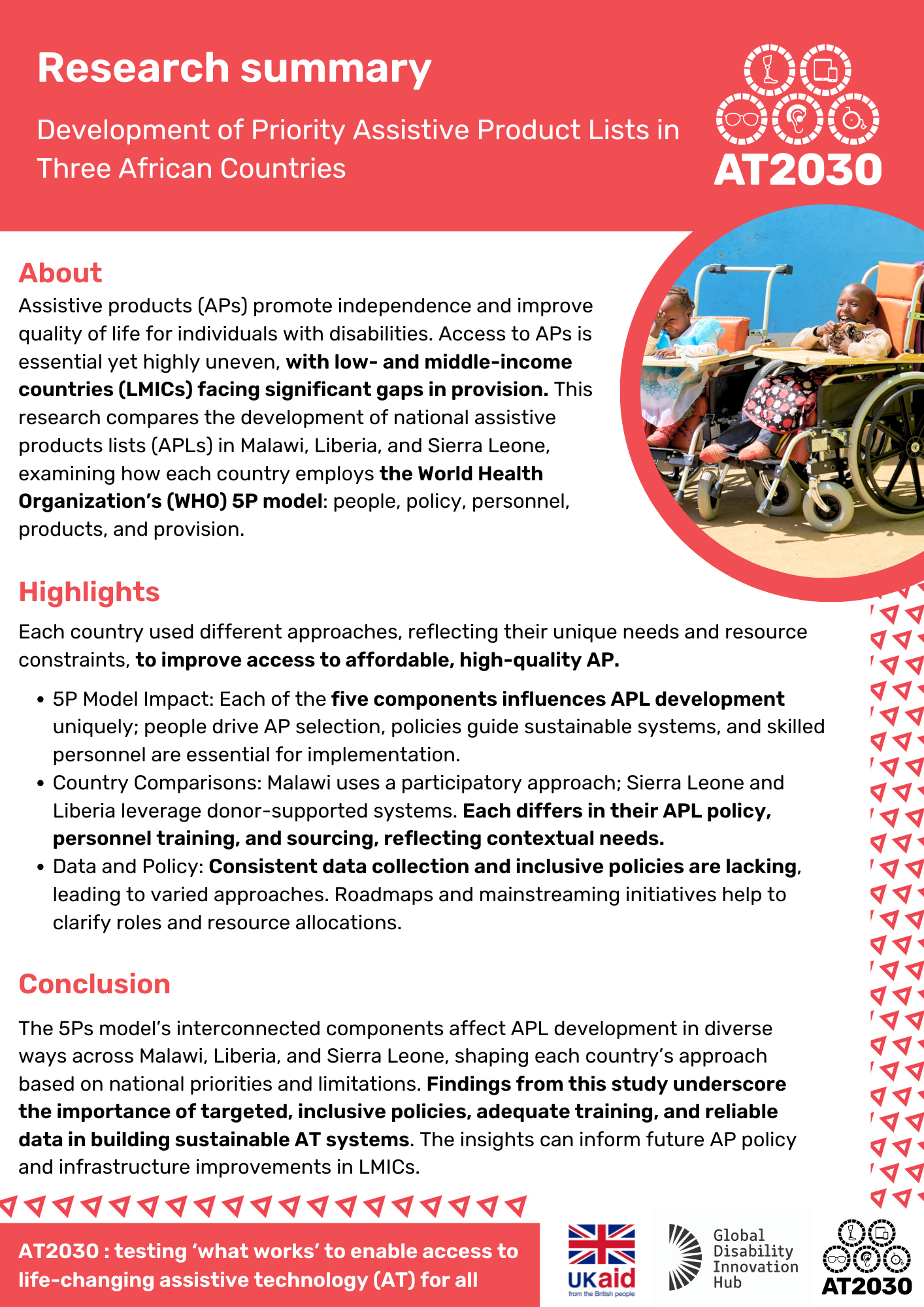
Development of Priority Assistive Product Lists in Three African Countries: Research Summary
Emma M. Smith, Ikenna D. Ebuenyi, Ying Zhang, Laura LigthartNov. 7, 2024Research SummariesAccess to assistive products (APs) is crucial for the independence of people with disabilities, yet availability is limited, especially in low- and middle-income countries (LMICs). This study compares the development of national AP lists in Malawi, Liberia, and Sierra Leone using the WHO’s 5P model—people, policy, personnel, products, and provision—each country tailoring the model to local needs. Findings emphasize that inclusive policies, trained personnel, and reliable data are essential for improving AP access, providing insights to guide future AP policies and infrastructure in LMICs.
-
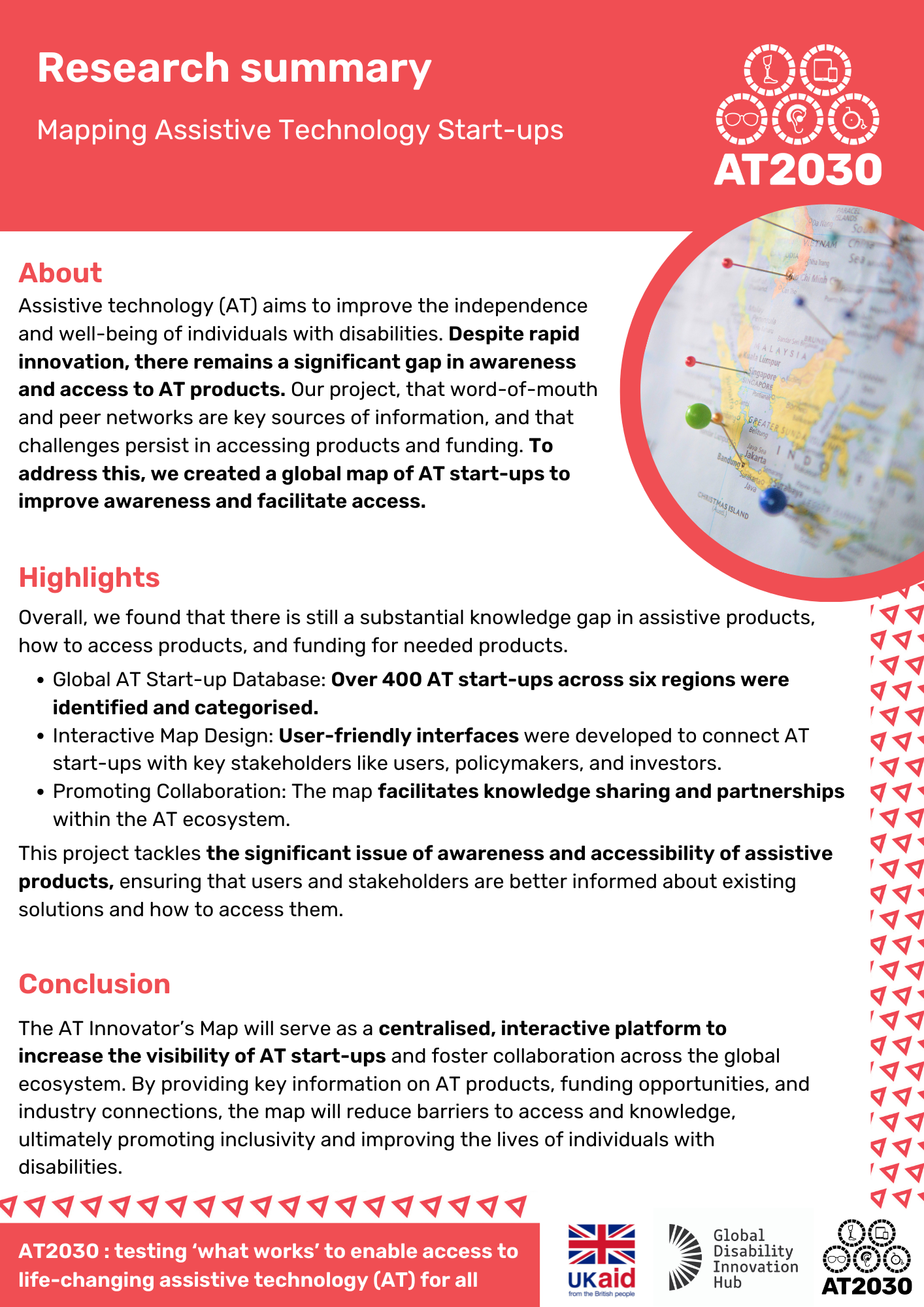
Mapping Assistive Technology StartUps: Research Summary
Patel Dilisha, Catherine Holloway, Tigmanshu BhatnagarNov. 7, 2024Research SummariesAssistive technology (AT) plays a crucial role in enhancing the independence and well-being of individuals with disabilities, but there is a significant gap in awareness and access to these products. Through focus group discussions, we identified that word-of-mouth and peer networks are primary sources of information about AT, and challenges persist in accessing products and funding. To address this, we developed an interactive map showcasing over 400 global AT start-ups, designed to increase visibility, foster collaboration, and connect users, developers, and investors, ultimately bridging the gap in the AT ecosystem.
-
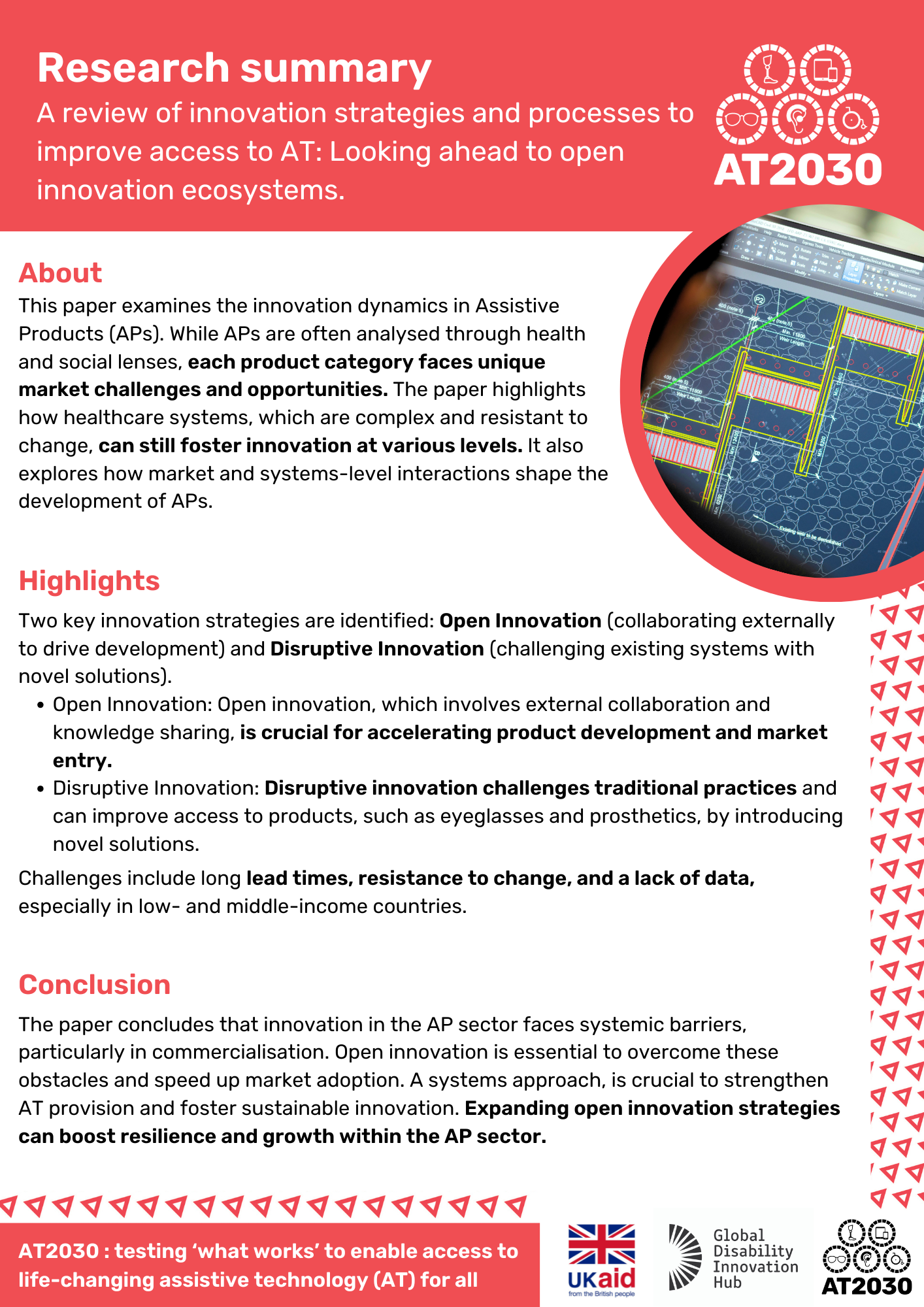
A review of innovation strategies and processes to improve access to AT: Looking ahead to open innovation ecosystems: Research Summary
Felipe Ramos Barajas, Vicki Austin, Dr Ben Oldfrey, Catherine Holloway, Dr Giulia Barbareschi, Malcolm MacLachlan, Rainer Kattel, Joanne McVeigh, Priya Morjaria, Tigmanshu Bhatnagar, George Torrens, Ikenna D. Ebuenyi, Jessica Massie, Dafne Zuleima Morgado Ramirez, Fiona Meeks, Kyle Keane, Cheryl D Metcalf, Srinivasan Sujatha, P. V. M. RaoNov. 7, 2024Research SummariesThis paper explores innovation in Assistive Products (APs), such as wheelchairs, prosthetics, eyeglasses, and hearing aids, emphasising how market dynamics and healthcare systems influence their development. It highlights the importance of *Open Innovation* and *Disruptive Innovation* in overcoming challenges like long lead times, resistance to change, and data gaps, particularly in low-income settings. The paper advocates for enhanced collaboration among stakeholders and recommends leveraging open innovation strategies to accelerate commercialisation and strengthen AP provision.
-
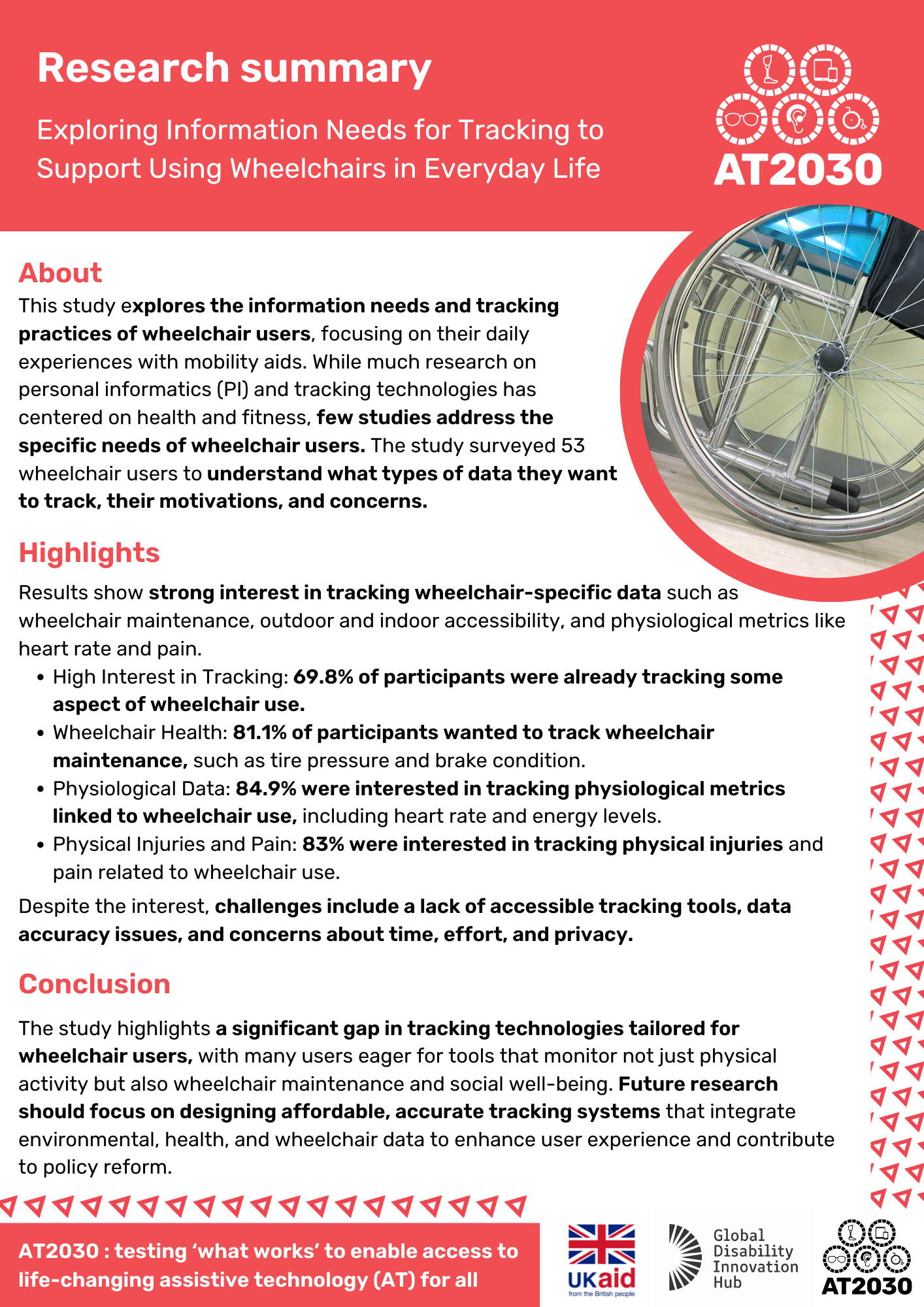
Exploring Information Needs for Tracking to Support Using Wheelchairs in Everyday Life: Research Summary
Wen Mo, Catherine Holloway, Aneesha SinghNov. 7, 2024Research SummariesThis study explores the tracking needs of wheelchair users, surveying 53 participants to understand their data preferences. Findings reveal strong interest in tracking wheelchair maintenance, accessibility, and physiological data like heart rate and pain. Users also seek to monitor social interactions and wheelchair skill development for both physical and mental well-being. Challenges include limited tracking tools, data accuracy issues, and concerns about privacy. The study calls for affordable, accurate tracking systems integrating mobility, health, and environmental data to enhance user experience and support policy reform.
-
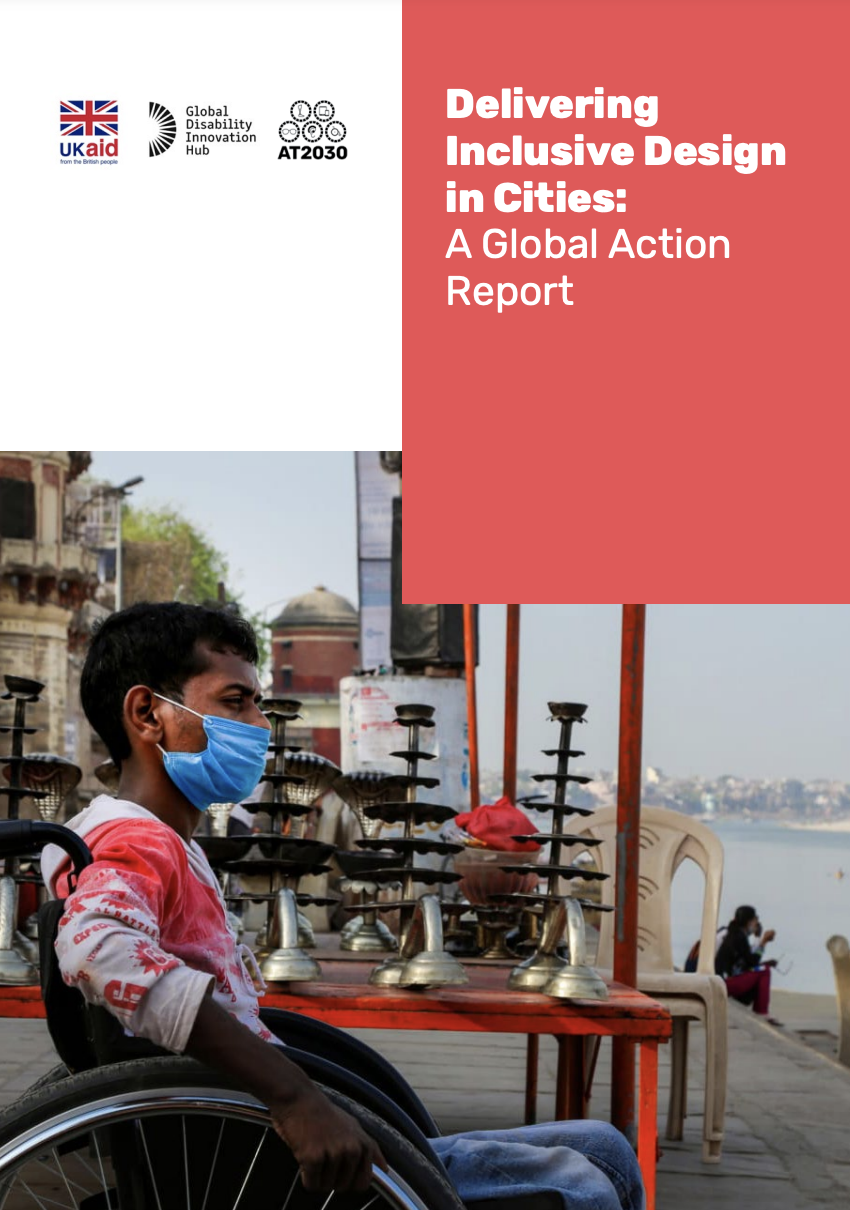
Inclusive Cities
Global Disability Innovation HubNov. 7, 2024GlobalCase Studies and ReportsThe Inclusive Infrastructure sub-programme, led by GDI Hub, recognises that the built environment, the world where we live, dictates our ability to use the AT we need. Access to the built environment is a fundamental human right, protected by the UN CRPD. However, the world we have designed and built presents a multitude of barriers and challenges for many, including persons with disabilities.
-
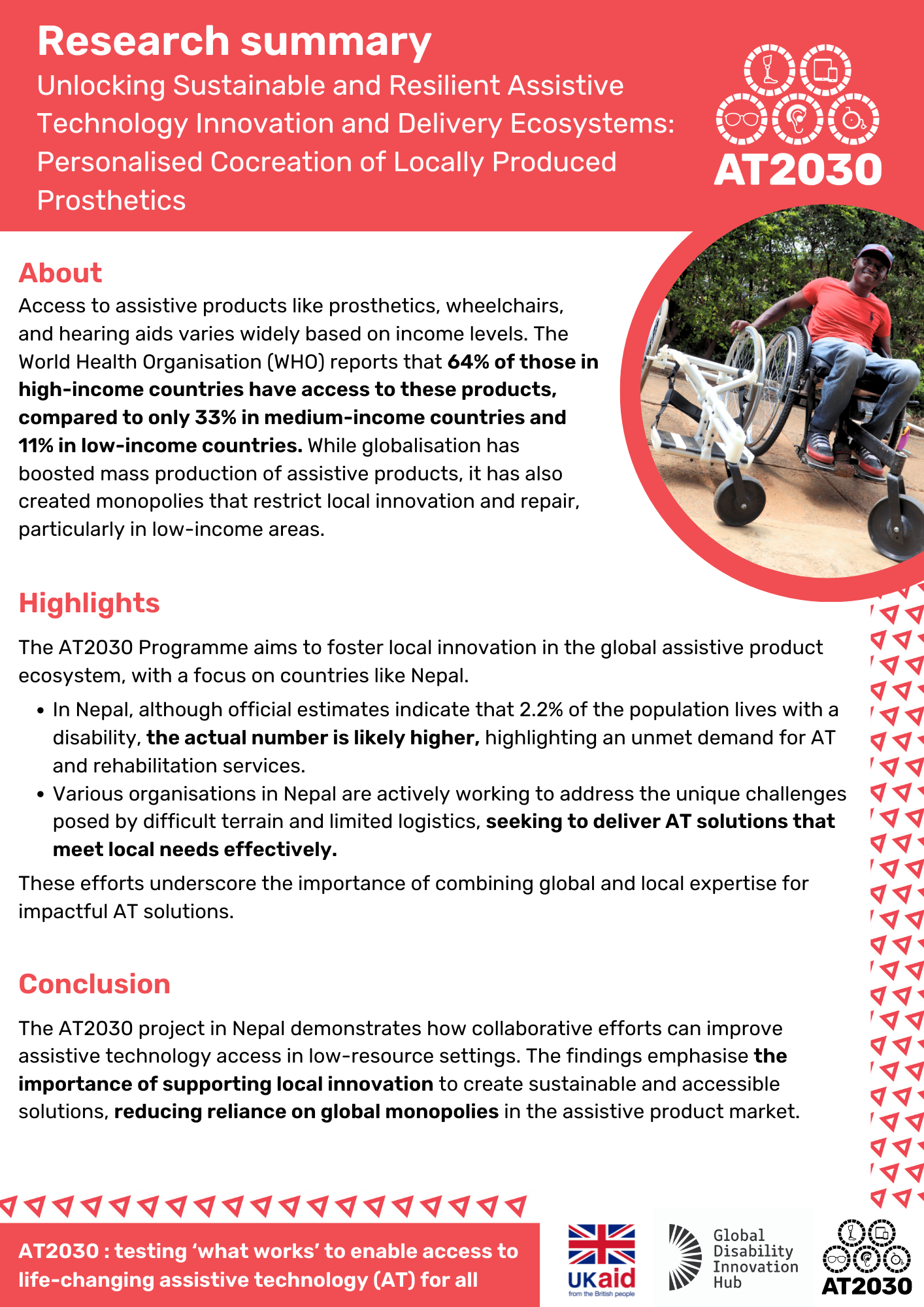
Unlocking Sustainable and Resilient Assistive Technology Innovation and Delivery Ecosystems: Personalised Cocreation of Locally Produced Prosthetics: Research Summary
Dr Ben Oldfrey, Catherine Holloway, Ashish Thapa, Mark Miodownik, Tigmanshu Bhatnagar, Bikash Paudel, RAM CHANDRA THAPA, Pratisthit Lal Shrestha, Amit Bajracharya, Ganga Gurung, Rosemary GowranNov. 7, 2024NepalResearch SummariesAccess to assistive products like prosthetics and wheelchairs is unequal globally, with only 11% access in low-income countries. The AT2030 Programme promotes local AT innovation, focusing on needs in countries like Nepal, where disability rates are likely underestimated. By fostering global-local collaboration, the project aims to improve AT access and reduce dependency on monopolistic production, supporting sustainable, accessible solutions.
-
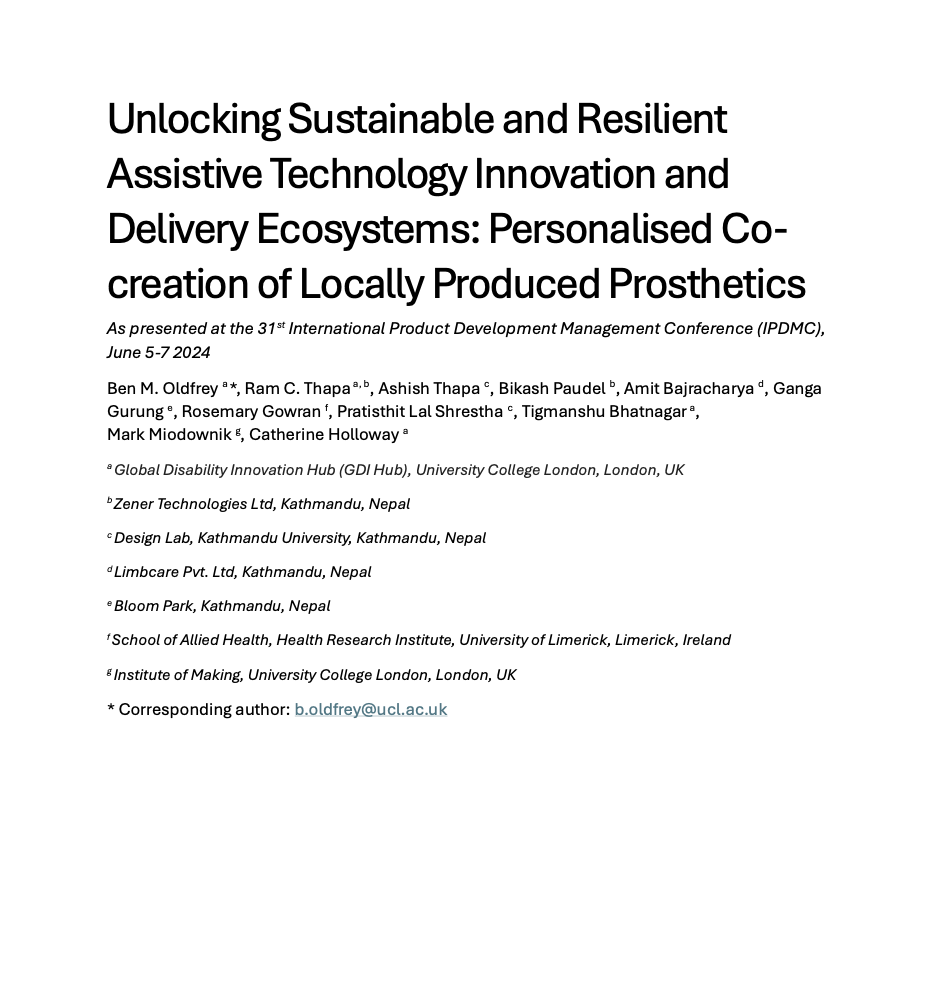
Unlocking Sustainable and Resilient Assistive Technology Innovation and Delivery Ecosystems: Personalised Co-creation of Locally Produced Prosthetics
Dr Ben Oldfrey, RAM CHANDRA THAPA, Ashish Thapa, Bikash Paudel, Amit Bajracharya, Ganga Gurung, Rosemary Gowran, Pratisthit Lal Shrestha, Tigmanshu Bhatnagar, Mark Miodownik, Catherine HollowayNov. 5, 2024NepalAcademic Research PublicationsThe World Health Organisation (WHO) reports significant disparities in access to assistive products, with 64% access in high-income countries compared to 33% in medium-income and 11% in low-income countries. The AT2030 Programme, led by the Global Disability Innovation Hub in Nepal, aims to enhance local innovation in assistive technology (AT). In Nepal, the estimated disability rate is only 2.2%, likely underestimated, as organisations work to provide tailored AT and rehabilitation services. This paper outlines our experiences in the AT2030 project, focusing on developing a global-local community, interdisciplinary innovation teams in Kathmandu, and preliminary findings from bespoke product development cases.
-
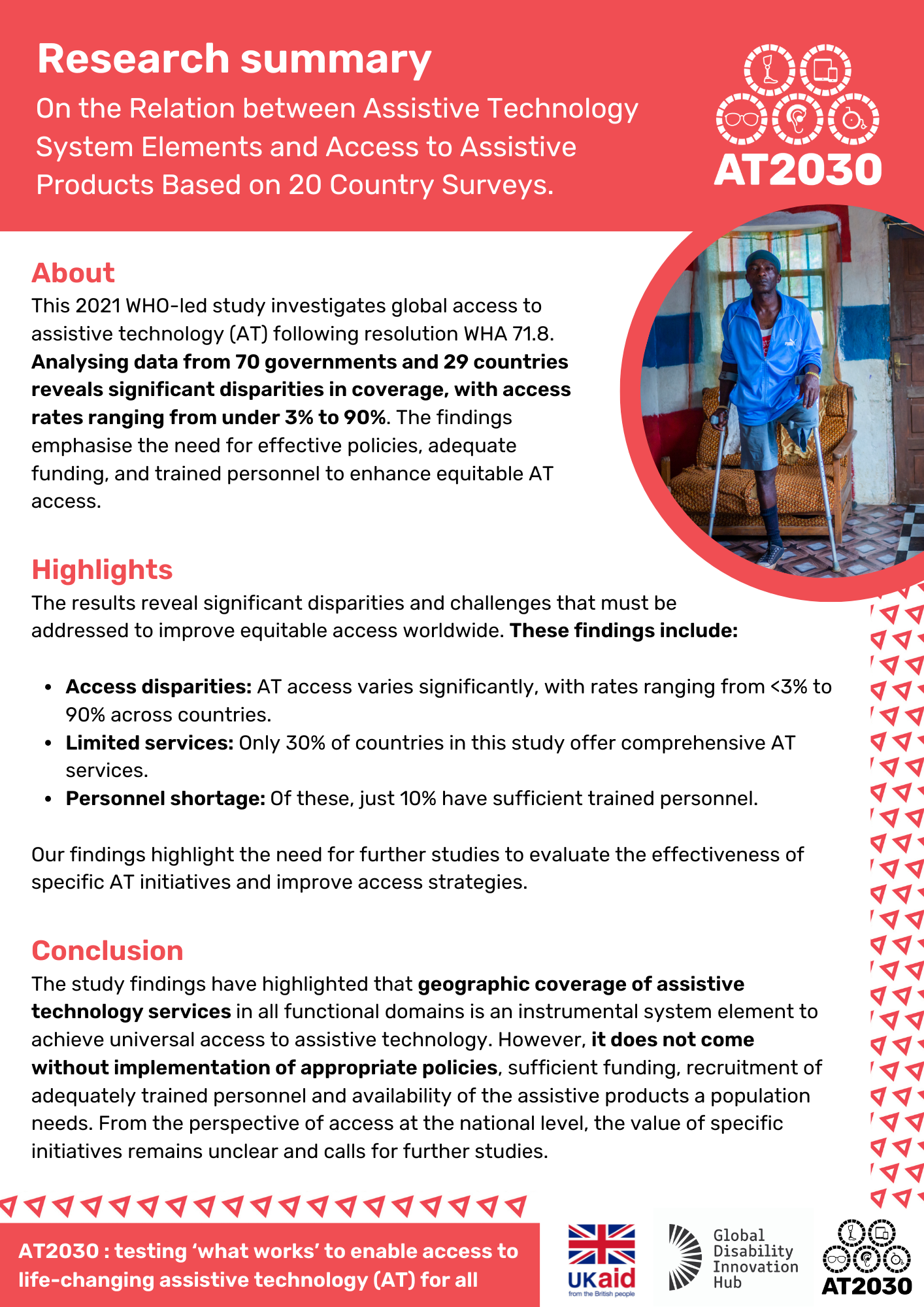
On the Relation between Assistive Technology System Elements and Access to Assistive Products Based on 20 Country Surveys - Research Summary
Wei Zhang, Johan Borg, Irene Calvo, Chapal Khasnapis, Mikael Winberg, Arne H EideNov. 1, 2024Research SummariesClick here to read a summary of the WHO-led 2021 study on global access to assistive technology (AT). The study reveals significant disparities in AT access, with rates ranging from less than 3% to 90% across countries. While many nations have AT policies, only 30% provide comprehensive services, and just 10% have sufficient trained personnel. Further research is essential to evaluate specific initiatives and enhance equitable access worldwide.
-
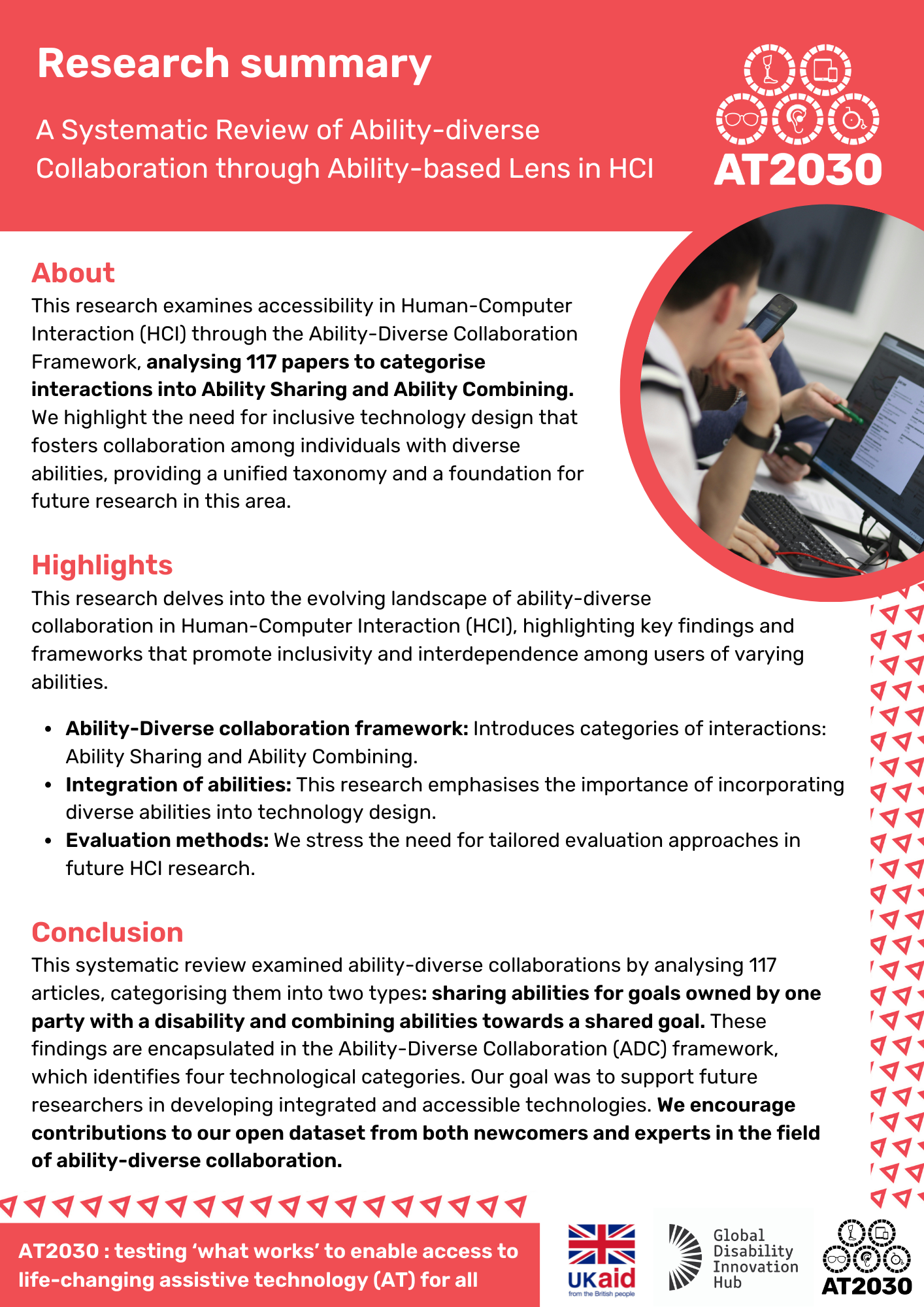
A Systematic Review of Ability-diverse Collaboration through Ability-based Lens in HCI Research Summary
Catherine Holloway, Lan Xiao, Katrin Angerbauer, Tigmanshu Bhatnagar, Weiyue Lin, Maryam Bandukda, Michael SedlmairNov. 1, 2024Research SummariesThis paper analyses 117 articles from the ACM Digital Library over the past two decades, offering (1) a unified taxonomy and the Ability-Diverse Collaboration Framework, (2) a reflective discussion of the current design landscape, and (3) insights into future research opportunities and challenges. We have also made our data and analysis tool available for contributions from the HCI research community.
-
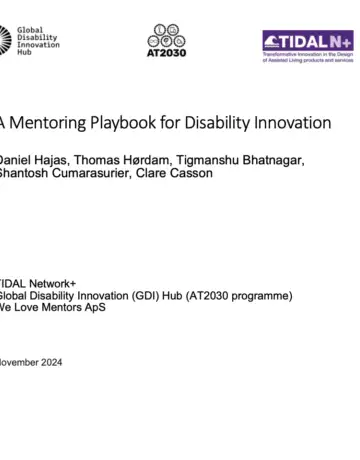
A Mentoring Playbook for Disability Innovation
Daniel Hajas, Thomas Hørdam, Tigmanshu Bhatnagar, Shantosh Cumarasurier, Clare CassonNov. 1, 2024AT2030 ResourcesThis playbook provides a comprehensive guide for organisations seeking to launch and manage mentoring programmes aimed at early career researchers (ECRs) and start-ups in the disability innovation sector. Rooted in the experiences of the TIDAL ECR Accelerator, insights from the Attvaran Accelerator, run by GDI Hub as part of the AT2030 programme, and We Love Mentors, this playbook outlines a practical and adaptable framework for fostering mentoring in a complex, yet essential, area of innovation.
-
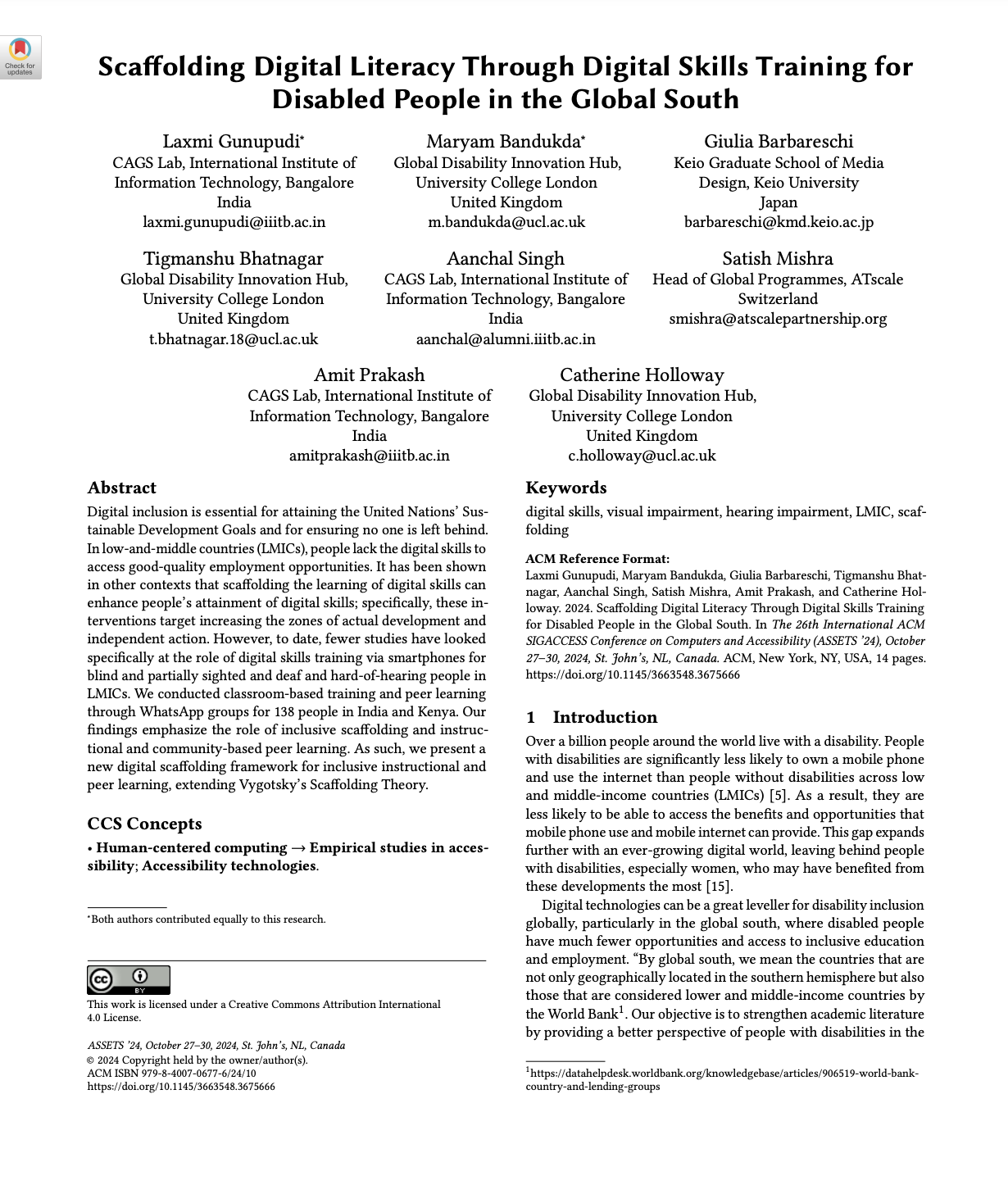
Scaffolding Digital Literacy Through Digital Skills Training for Disabled People in the Global South
Laxmi Gunupudi, Maryam Bandukda, Giulia Barbareschi, Tigmanshu Bhatnagar, Aanchal Singh, Satish Mishra, Amit Prakash, Catherine HollowayOct. 27, 2024Academic Research PublicationsDigital inclusion is key to the UN’s Sustainable Development Goals. In LMICs, limited digital skills hinder employment, especially for disabled individuals. Our study in India and Kenya trained 138 participants using classroom instruction and WhatsApp-based peer learning. We found that inclusive scaffolding and community-based learning are essential, leading to a new digital scaffolding framework extending Vygotsky’s Theory to enhance digital skills for all.
-
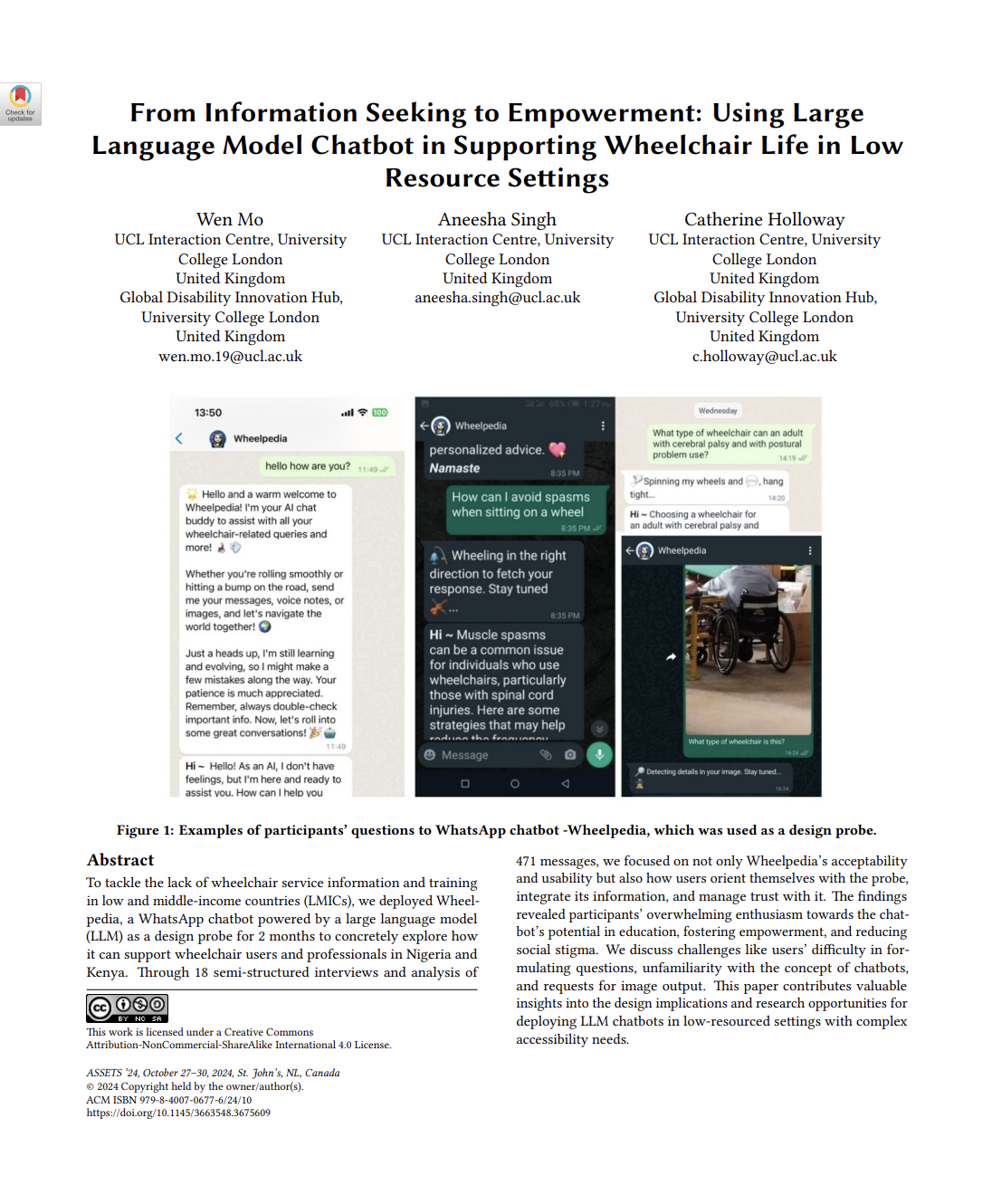
From Information Seeking to Empowerment: Using Large Language Model Chatbot in Supporting Wheelchair Life in Low Resource Settings
Wen Mo, Aneesha Singh, Catherine HollowayOct. 27, 2024Academic Research PublicationsWe deployed Wheelpedia, a WhatsApp chatbot, in Nigeria and Kenya to address wheelchair service gaps. Through interviews and message analysis, we explored its usability, trust, and impact on education and empowerment. Findings highlight challenges and opportunities for LLM chatbots in low-resource settings.
-
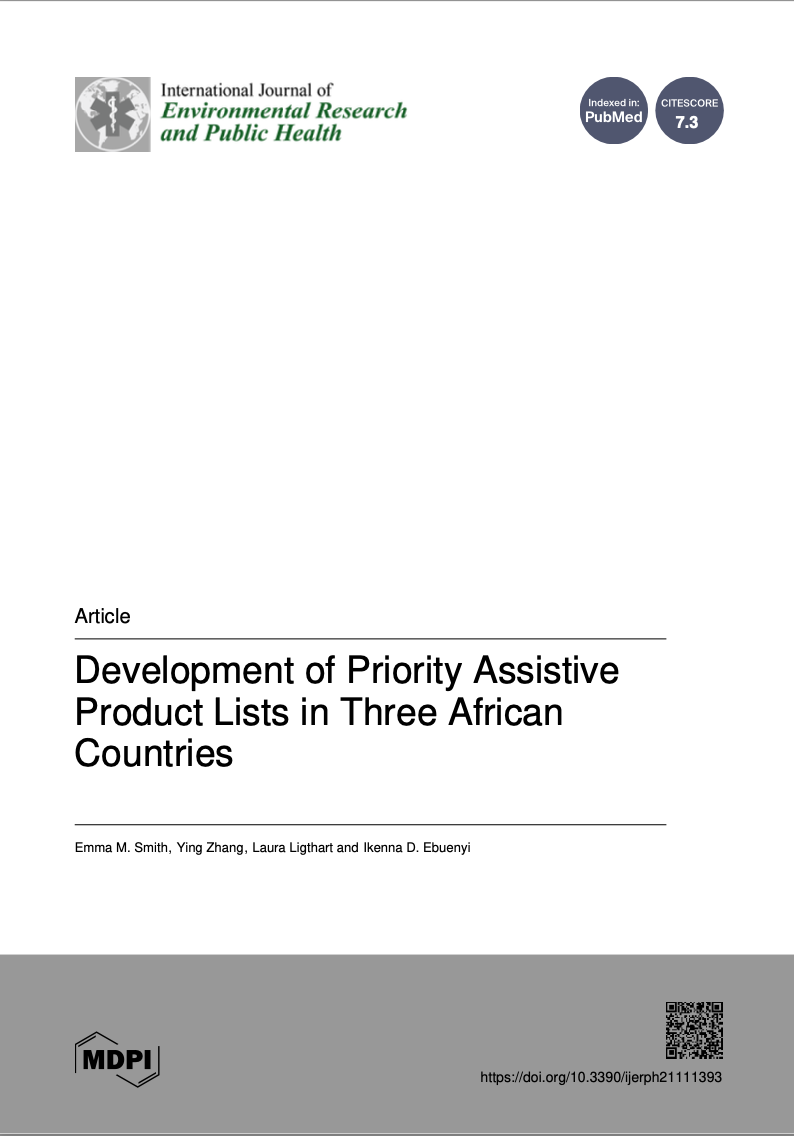
Development of Priority Assistive Product Lists in Three African Countries
Emma M. Smith, Ikenna D. Ebuenyi, Ying Zhang, Laura LigthartOct. 23, 2024Academic Research PublicationsNational Assistive Product Lists (APLs) are vital for improving access to assistive products, which enhance the well-being of people with disabilities and functional limitations. This study compares how the World Health Organization’s 5Ps model (people, personnel, policy, provision, products) influenced the development of national APLs in Malawi, Liberia, and Sierra Leone, aiming to improve assistive product service delivery.
-
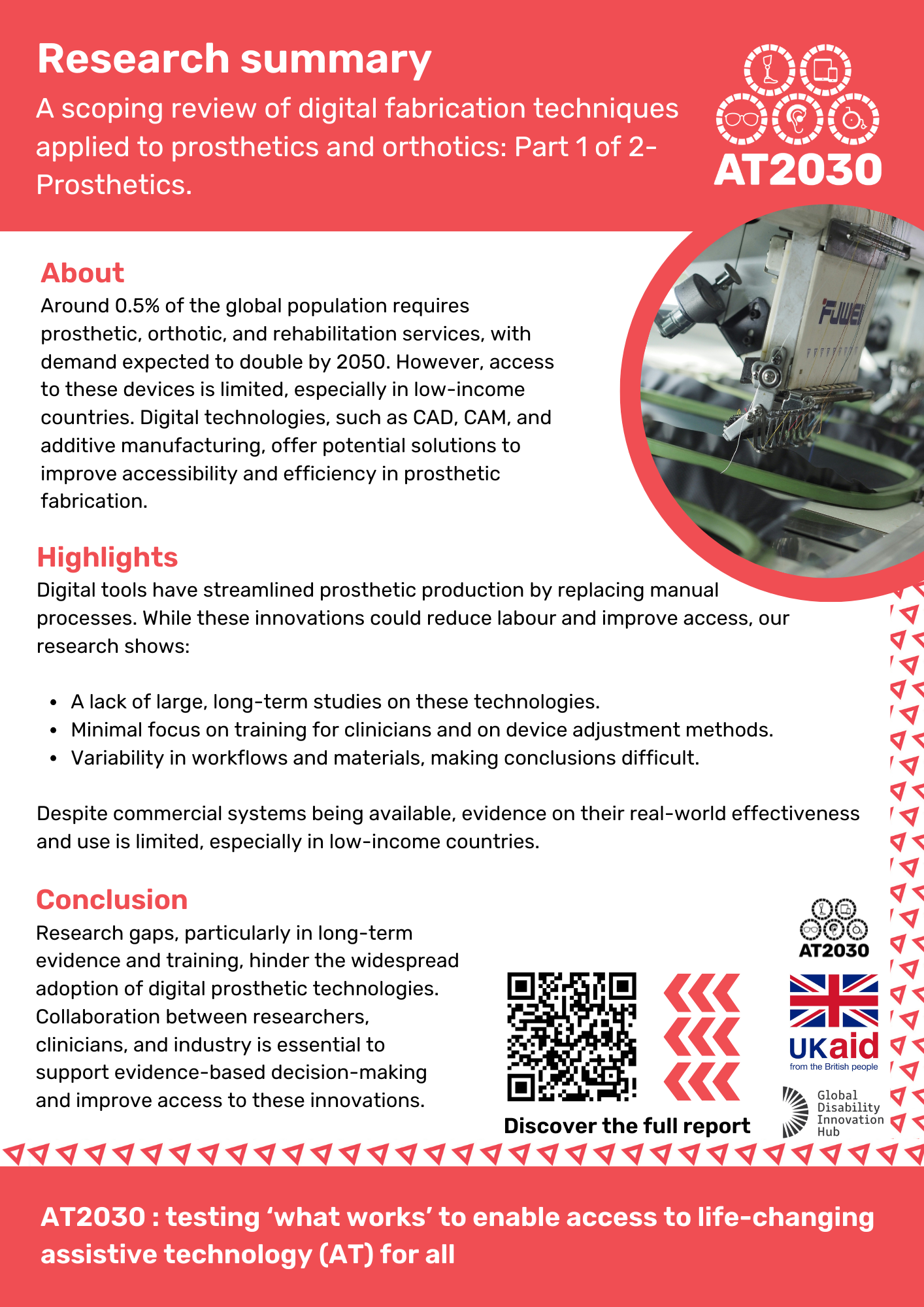
A scoping review of digital fabrication techniques applied to prosthetics and orthotics: Part 1 of 2-Prosthetics (Summary)
Dr Ben Oldfrey, Catherine Holloway, Margaret K Donovan-HallOct. 18, 2024GlobalResearch SummariesClick here to read a summary of our review on digital fabrication techniques applied to prosthetics and orthotics. Digital fabrication offers potential to improve global prosthetic access, but gaps in research, large-scale studies, training, and workflow standardisation hinder evidence-based adoption and practical implementation in real-world clinical settings.
-
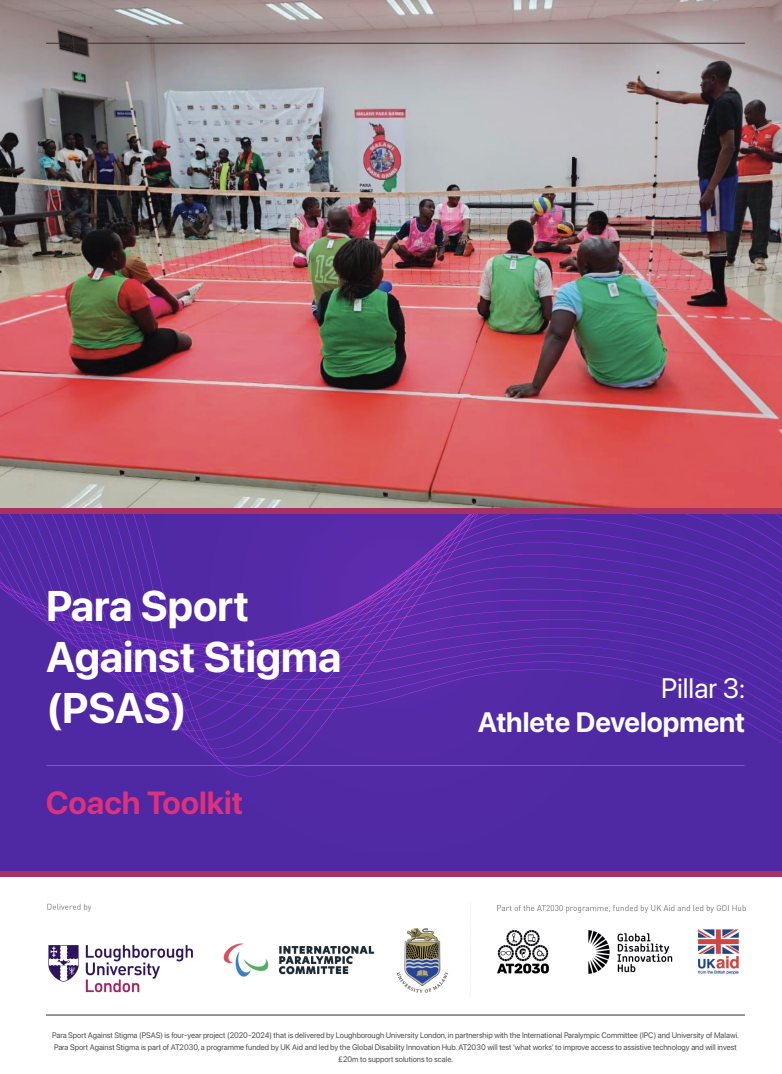
PSAS Coach Toolkit
Global Disability Innovation Hub, Loughborough University, The International Paralympic Committee (IPC), University of MalawiSept. 30, 2024MalawiAT2030 ResourcesThis toolkit is aimed at supporting coaches who work with disabled athletes within their national and international sporting systems. The toolkit is designed to provide useful information and step-by-step guides on important aspects of Para sport, such as classification systems and processes, competition requirements, coaching checklists and communication methods.
-
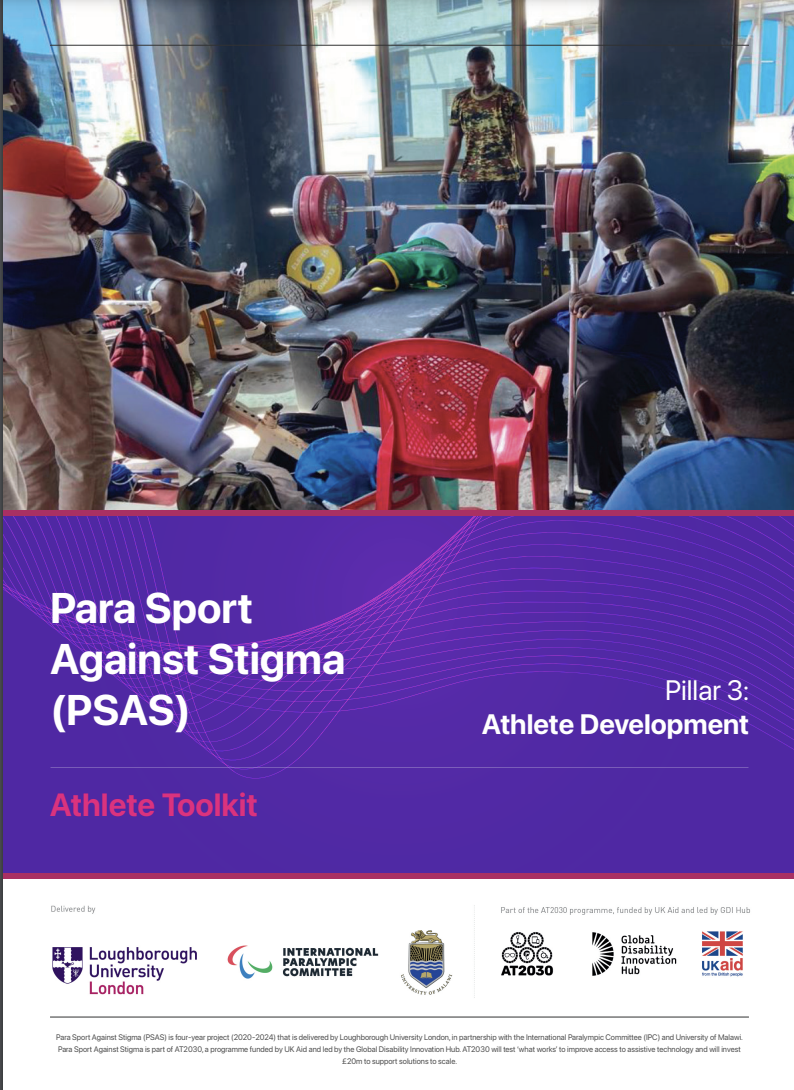
PSAS Athlete Toolkit
Global Disability Innovation Hub, Loughborough University, The International Paralympic Committee (IPC), University of MalawiSept. 30, 2024Ghana, Malawi and ZambiaAT2030 ResourcesThis toolkit is aimed at athletes with a disability who aspire to become world class and compete for their country at an international level. The toolkit is designed to provide useful information and step by step guides on important aspects of Para sport such as classification, competition, coaching and communication.
-
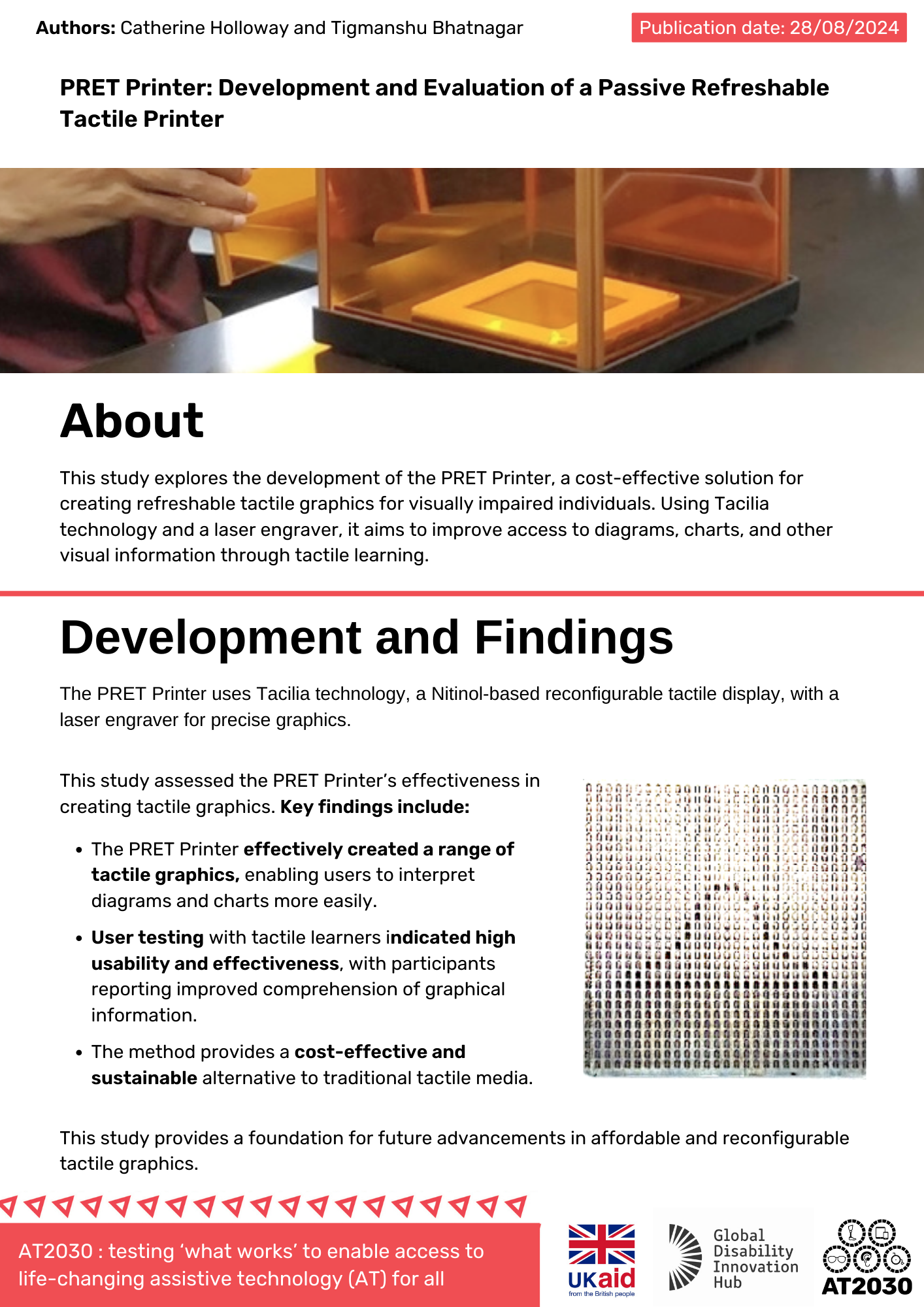
PRET Printer: Development and Evaluation of a Passive Refreshable Tactile Printer - Research Summary
Catherine Holloway, Tigmanshu BhatnagarAug. 28, 2024Research SummariesThe study explores the development of the PRET Printer, a cost-effective solution for creating refreshable tactile graphics for visually impaired individuals. Using Tacilia technology and a laser engraver, the system produces precise, reconfigurable tactile graphics. Testing showed high usability, with users reporting improved comprehension of diagrams and charts.
-
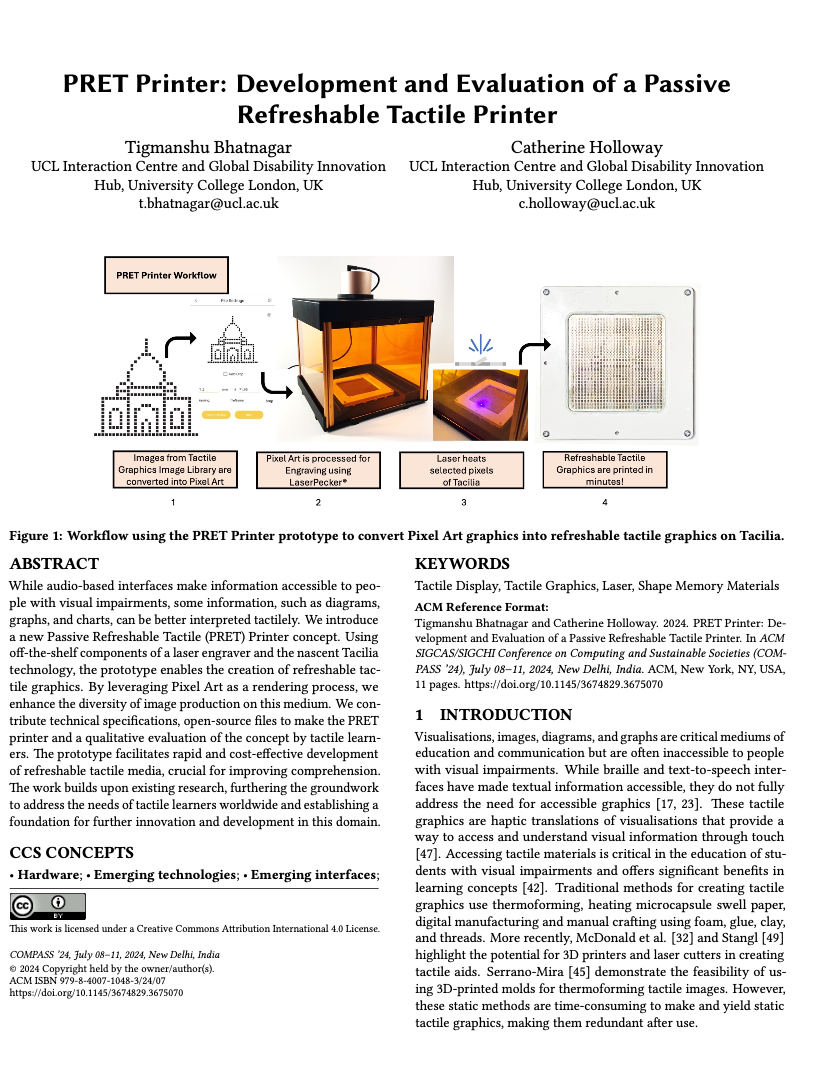
PRET Printer: Development and Evaluation of a Passive Refreshable Tactile Printer
Catherine Holloway, Tigmanshu BhatnagarAug. 28, 2024Academic Research PublicationsWhile audio-based interfaces make information accessible to people with visual impairments, some information, such as diagrams, graphs, and charts, can be better interpreted tactilely. We introduce a new Passive Refreshable Tactile (PRET) Printer concept. Using off-the-shelf components of a laser engraver and the nascent Tacilia technology, the prototype enables the creation of refreshable tactile graphics.
-
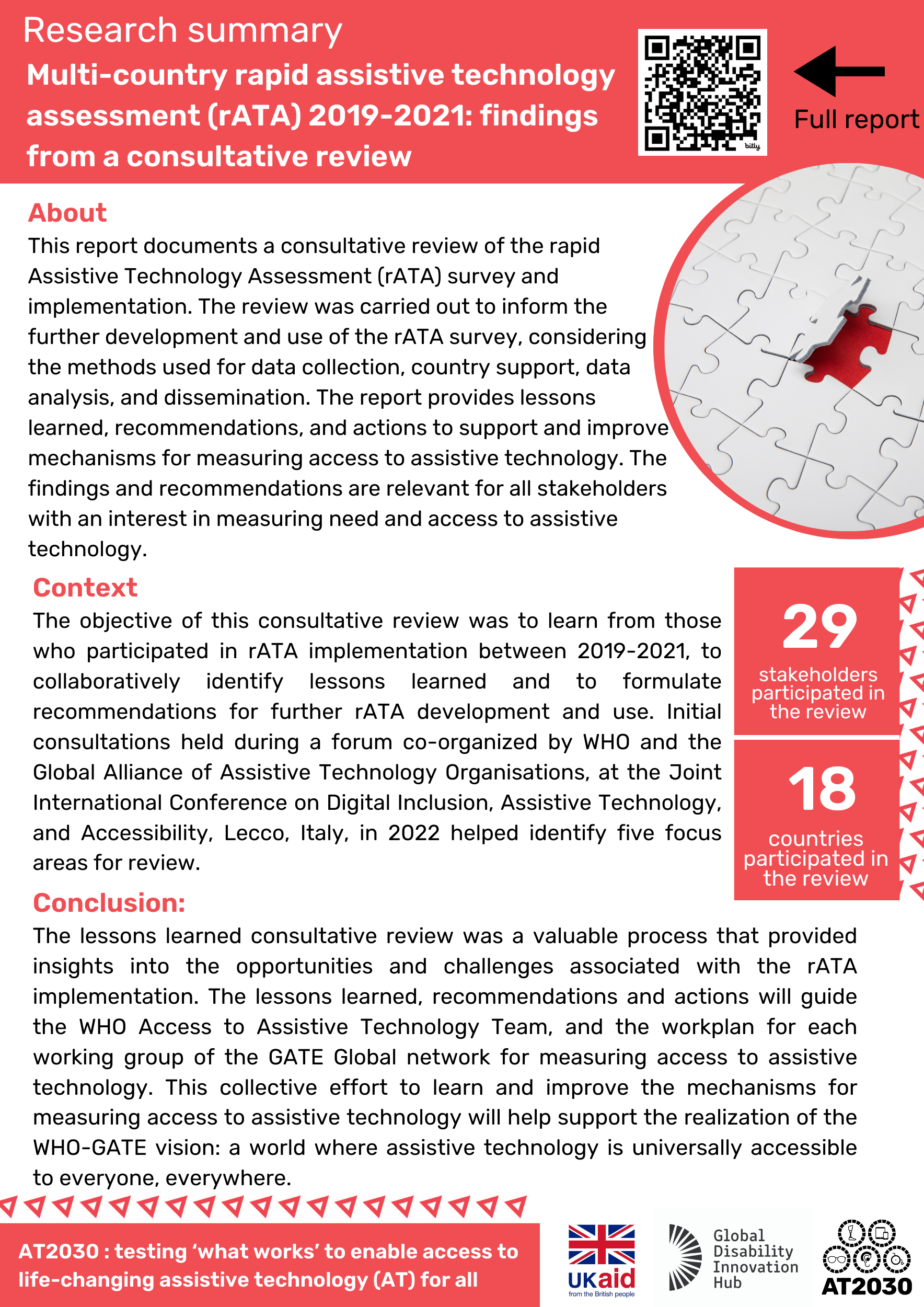
Research Summary: Multi-country rapid Assistive Technology Assessment (rATA) 2019-2021: findings from a consultative review
Global Disability Innovation Hub, World Health OrganizationJuly 25, 2024GlobalResearch SummariesThis research summary provides key highlights and snapshot content from the Multi-country rapid Assistive Technology Assessment (rATA) 2019-2021: findings from a consultative review.
-
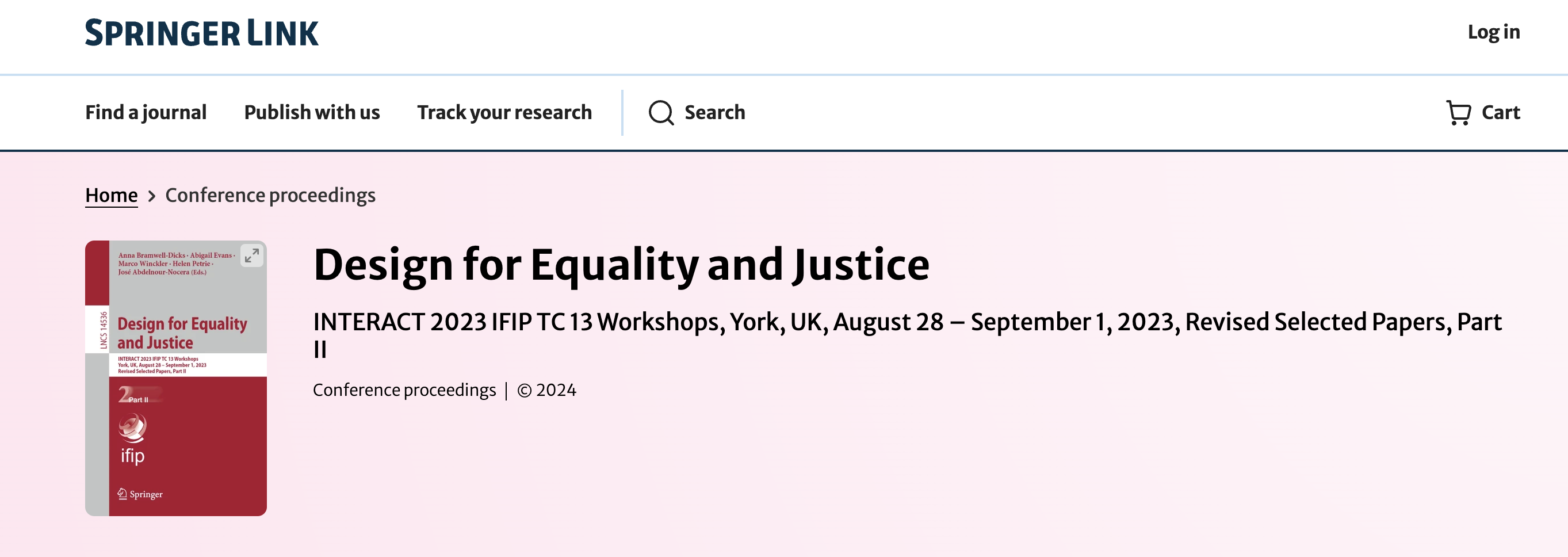
Mapping Assistive Technology Start-ups
Catherine Holloway, Tigmanshu Bhatnagar, Patel DilishaJuly 16, 2024GlobalAcademic Research PublicationsThis paper explored their experiences of providing and accessing AT, including procurement strategies, adoption of new technologies, and provision pathways. Overall, we found that there is still a substantial knowledge gap in assistive products, how to access products, and funding for needed products. These discussions also enlightened us that word-of-mouth and peer networks are the main avenues through which knowledge of assistive products is shared. Difficulties in keeping up with the expanding innovative landscape was raised as a key concern.
Previous PageNext Page